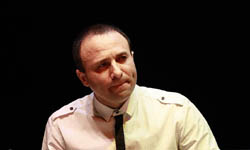> [Archived] Interviews

The George Enescu Festival - Interview with pianist Florin Raducanu
September 22nd, 19:30, the Small Palace Hall
I
met Florin Raducanu when he was a student at the National Music University
in Bucharest, when he was studying in the jazz group, headed and guided
by piano player and composer Mircea Tiberian. Since then, until now,
he has been making amazing progress, not only as a performer (pianist-improviser)
but also as a jazz teacher and composer. Although young (born in 1973),
Florin Raducanu did not stop his artistic activity, but also dedicated
a great part of his time to his students at the Music High School
in Bucharest, whose musical activity he stimulated through jazz and
improvisation. Through his performances, Florin demonstrated to us
the bridges between jazz and classical music. So his presence at the
George Enescu Festival this year is well-motivated.
'I studied classical music until I entered the Music University -I started with classical piano studies, and the path towards jazz came naturally, meaning that at one point I felt the need of more than just singing and performing a musical work written by somebody else. I was trying to find my own vision of music. The moment I met Mircea Tiberian at the Music University, I found a helping hand from him.
Then individual study followed, because every one has to follow his
or her own way; a condition of success is being honest and knowing
what you want. But I also think that we have spiritual guides who
lead us to where we have to go.
What is important, what is attractive about jazz? It is the creativity
part, and even that of spiritually finding oneself, in a way. Improvisation
lays the foundation for any jazz performer. But first, you have to
acquire discernment, which you gets through a solid academic education.'
Florin Raducanu
What type of music has influenced you throughout your evolution as
a jazz piano player?
Keith Jarrett influenced me a lot in the beginning and he continues
to be the jazz pianist who most rapidly reaches my inner core as an
artist. Then comes Herbie Hancock, with his vision of music - I'm
referring to fusion, classical jazz.
You got very close to classical works and tried to transform them,
and prepare them in a certain form for jazz. Have you had a model
in a jazz musician who has pursued this path?
While I was doing my PhD studies I was talking about this and I really
found many jazz musicians to have approached the 'classical-jazz'
fusion phenomenon, but this detail has rarely been emphasized in their
musical biography. I'm thinking about J. J. Johnson, Keith Jarret,
Herbie Hancock or Bill Evans - a pianist who has brought that 'voicing'
type of vision, taken over from choral harmony. Nearly all great jazz
performers who are also composers have started from this classical
education and at a certain moment they return to the great cultural
music.
What do you consider to be your greatest achievement in jazz?
The starting point of the 'third stream' project - symphonic jazz
with the Sibiu Philharmonics in 2006 and its continuation, as can
be seen, in 2009, at the George Enescu Festival.
The project is represented by the work 'Jazz Ecumenica', made up of
seven segments. It combines symphonic jazz parts with influences from
impressionistic music and 'folk' parts from several areas of the world.
However, improvisation is the key word in this musical project. The
group to perform the works I have written comprises a string orchestra,
a jazz combo and a South American percussion band.
Translated by Martin Potter and Sînziana Mihalache
MA Students, MTTLC, Bucharest University














